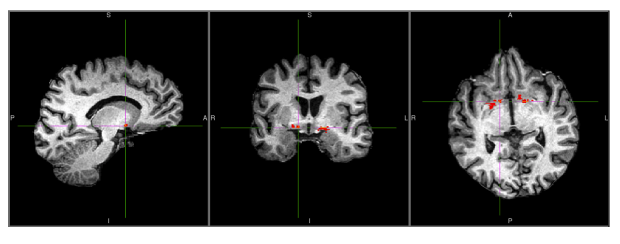Structural MRI Demonstrates Potential of Neflamapimod in Early Alzheimer’s Disease
 Structural MRI data presented at the 15th Annual Clinical Trials in Alzheimer's disease (CTAD) meeting in San Francisco demonstrates that neflamapimod may reverse pathologic disease progression in the basal forebrain cholinergic system in the early stages of Alzheimer's disease.
Structural MRI data presented at the 15th Annual Clinical Trials in Alzheimer's disease (CTAD) meeting in San Francisco demonstrates that neflamapimod may reverse pathologic disease progression in the basal forebrain cholinergic system in the early stages of Alzheimer's disease.
Researchers presented the results in a Late Breaking poster (LP12) entitled, "Effects of the p38α kinase inhibitor neflamapimod on the basal forebrain, assessed by structural MRI, in Alzheimer's disease (AD)". The major finding in the analysis was that 12 weeks of neflamapimod treatment in a phase 2a clinical trial in 14 patients with early AD was associated with a significant (p=0.03, median 4.5%) increase in the volume of the Nucleus Basalis of Meynert (NbM), the major cholinergic nucleus in the basal forebrain. In contrast, in longitudinal studies of untreated early AD patients there is a decrease in NbM volume over time. That neflamapimod could reverse NbM atrophy is in line with recently published preclinical results in Ts2 mice (Jiang et al, 2022), in which neflamapimod reversed the neurodegenerative phenotype in the basal forebrain.
Neflamapimod is an investigational oral, brain-penetrating small molecule drug that inhibits the intra-cellular enzyme p38MAP kinase alpha (p38a). P38a plays a major role in inflammation-induced synaptic toxicity, leading to impaired synaptic function. In pre-clinical studies, neflamapimod reverses synaptic dysfunction, including within the part of the brain most affected by Dementia with Lewy bodies (DLB) – the basal forebrain cholinergic system.
Results from the AscenD-LB Phase 2a clinical study in patients with DLB demonstrated neflamapimod significantly improved cognition and function as measured by the gold standard dementia rating test, the Clinical Dementia Rating Sum-of-Boxes (CDR-SB), and showed significant impact on motor function as measured by the Timed Up and Go test (TUG). In addition, at 40mg TID, the higher of two doses in the study, neflamapimod improved outcomes on a cognitive test battery ("Neuropsychological Test Battery", NTB) designed to evaluate the cognitive domains most prominently impacted in DLB, attention and executive function. The combined pre-clinical and clinical data are consistent with neflamapimod treating the underlying disease process and having the potential to be the first disease-modifying treatment for DLB. A confirmatory phase 2b clinical trial of neflamapimod in patients with DLB is planned to be initiated in the first quarter of 2023.